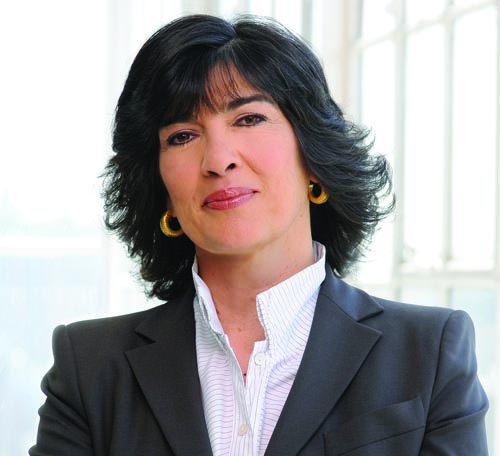November 08-2013

Christiane Amanpour has left New York and is now once again settled in London with her American husband and 13-year-old son and continuing as host of CNN International’s main daily news program.
Amanpour clearly sees London as “home,” though she has lived in Iran, Britain and the United States at various times in her 55 years.
In August 1998, she married Jamie Rubin, then the State Department spokesman and life became even more complicated. At first, he lived in Washington and she was based in London. But in 2000, Rubin left the government and went to join Amanpour in London where he got a job teaching and tried anchoring a news program on British TV, though that was not especially successful.
In 2008, they moved to New York as Rubin wanted to get back in the swing of American politics in that election year. But Rubin never got a post in the Obama Administration.
Amanpour shifted to ABC News as host of “This Week,” the network’s Sunday news show. Many people questioned having a host known for international news coverage running a program focused on domestic politics. Viewership did not change much under Amanpour. She didn’t wins hordes of viewers, but she didn’t lose them either. Still, when the 2012 election year began, ABC decided to switch back to an American politically-oriented host.
Despite the frequent jaunts across the pond, as frequent flyers call the Atlantic, the marriage of Amanpour, a Roman Catholic by upbringing, and Rubin, who is Jewish, seems to be flourishing.
In 2008, the Evening Standard of London questioned Amanpour about how two successful, career-minded people make marriage work.
“It’s a marriage of sacrifices, yes. I don’t know how much it will change in America, but it’s had its ups and downs in terms of how much we see each other. In the first years of our marriage, we just commuted and saw each other very little.”
She said that when she told people she was pregnant, the usual response was, “How?”
“Once our son was born, my husband came here [to London] and we saw each other more, though I was traveling a lot.
“Making it work is about generosity of spirit, not trying to compete. And, sure, I have a fantastic nanny, who I call ‘deputy mum.’ It’s also about patience, tolerance. It’s easier said than done, but these are the ideals.”
With a child, Amanpour admitted to fearing that she might be killed on one of her assignments and thus be a failure as a mother. She cut down on the travel and focused on studio work, which she now does full time so she is home every night.
Recently, she sat down with Celia Watson of The Telegraph of London and chatted. The main subject between the two working women was working women.
“Can I tell you something that really p––––– me off?” Christiane asked. “It’s that a lot of guys are still uncomfortable with the notion of female equality and the fact that many women have now risen up or become the chief breadwinners in their families,” as Amanpour has.
“There’s more equality in our society and that’s hard for a lot of men, after thousands of millennia of being the big chiefs. I understand that these things take time.”
Asked if she ever wished she were a man, Amanpour snaps back, “Never. I am delighted to be a woman. In my job, it’s just like being a man—but better.”
For one thing, Amanpour explains, “With wars becoming more like civil wars, it’s women and children who are the principal victims, so it’s much easier to get in. In some societies they won’t let a male journalist or cameraman in—but they will let in a woman.
“Being a woman has also helped because of the particular dynamic between men and women. When a man sees a woman coming, often the first thing they’ll do is pull out a chair or open a door. So you put your foot in that door and get in. Then you stay in.”
Whether as a reporter for CNN—where she was first hired in 1983 and went on to cover the Iran-Iraq war—or as an anchor woman, Amanpour has consistently “stayed in.” She has interviewed almost every world leader, including President Rohani last month. She made headlines last week with her interview of 16-year-old Malala Yousafzai, whose advocacy of education made her a target for the Taliban.
Has anyone ever succeeded in making her nervous? “I’m always nervous,” she admits. “I was nervous interviewing Malala and her father. It’s an adrenalin thing, until the interview starts. Then you think: ‘Ok, I’m in the zone.’ But I’m only nervous because I want to do my best. I never feel that I have nothing to prove any more.”
As the 11-year-old daughter of an Iranian travel agent and a Catholic Englishwoman, she left Tehran during the 1979 revolution and was educated at the Holy Cross School in Bucking-hamshire, England.
Certainly, she says, experiencing the chaos of revolution in her own country at such a young age had a profound effect. “Events change you. It made me want to tell those stories and make them understandable.”
Having completed a course in Fleet Street and studied journalism at the University of Rhode Island, Amanpour spent the following three decades ricocheting between both countries. Then, in May this year, she and her husband announced that they would be relocating to London.
“Right now I’d have to say that London is my home,” she said. “My family are in England, and my husband and I are loving reacquainting ourselves with all the friends we left behind.”
Then there’s her 13-year-old son, Darius – the only reason Amanpour has ever developed “the notion of fear and self-preservation, because I was so afraid of being killed or wounded and not being there for him.” Darius is in a new school in England “and enjoying it very much”. She insists that Britain is still “a power house” and says she never fails to be impressed by Britain’s “warrior spirit.”
Turning to the subject of Muslim women and hejab, Amanpour says. “If women choose to do it, they can; but if there is any aspect of coercion, it is not okay. Do I like to see people walking around with their faces covered? No. Malala never covered her face but she always covered her head. There are ways of being respectful.”
Not that modesty is simply a religious construct. “Personally I prefer to be modest than not. I don’t like to wear plunging necklines when I’m working.” She adds with a sideways glance: “It’s different when I’m not.”
Asked if she was ever encouraged to dress more seductively, she says, “No. I would have reacted pretty poorly if anybody had tried to tell me what to do with my clothes. I say to some colleagues: ‘Why are you wearing your skirt so short on air? Why is your neckline so low?’ They say: ‘We feel we’re forced to….’ Some of them, in other organizations, say ‘That’s what’s expected of us’.
“Before I achieved success, I was very clear about who I was. I wasn’t a militant, but I knew that I wasn’t comfortable [dressing] like that. It’s not professional. If you want to be serious you have to act that way. It’s easy to lose your reputation and your credibility.”
























